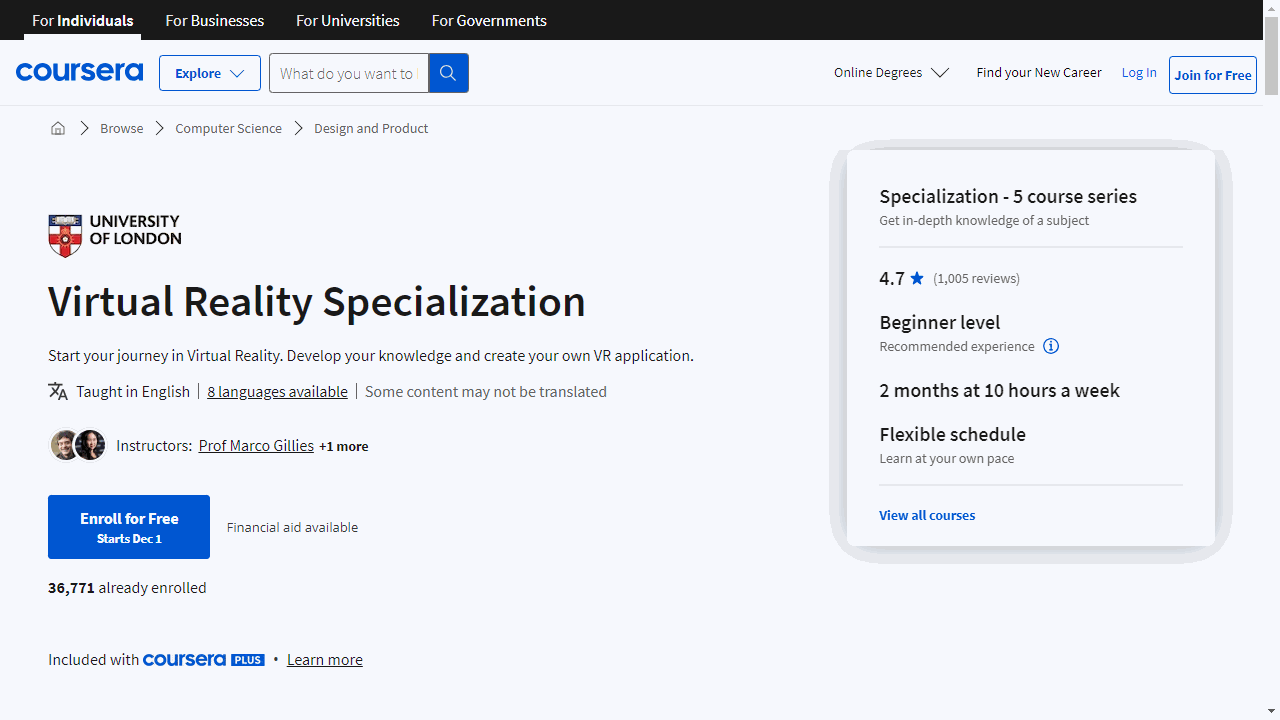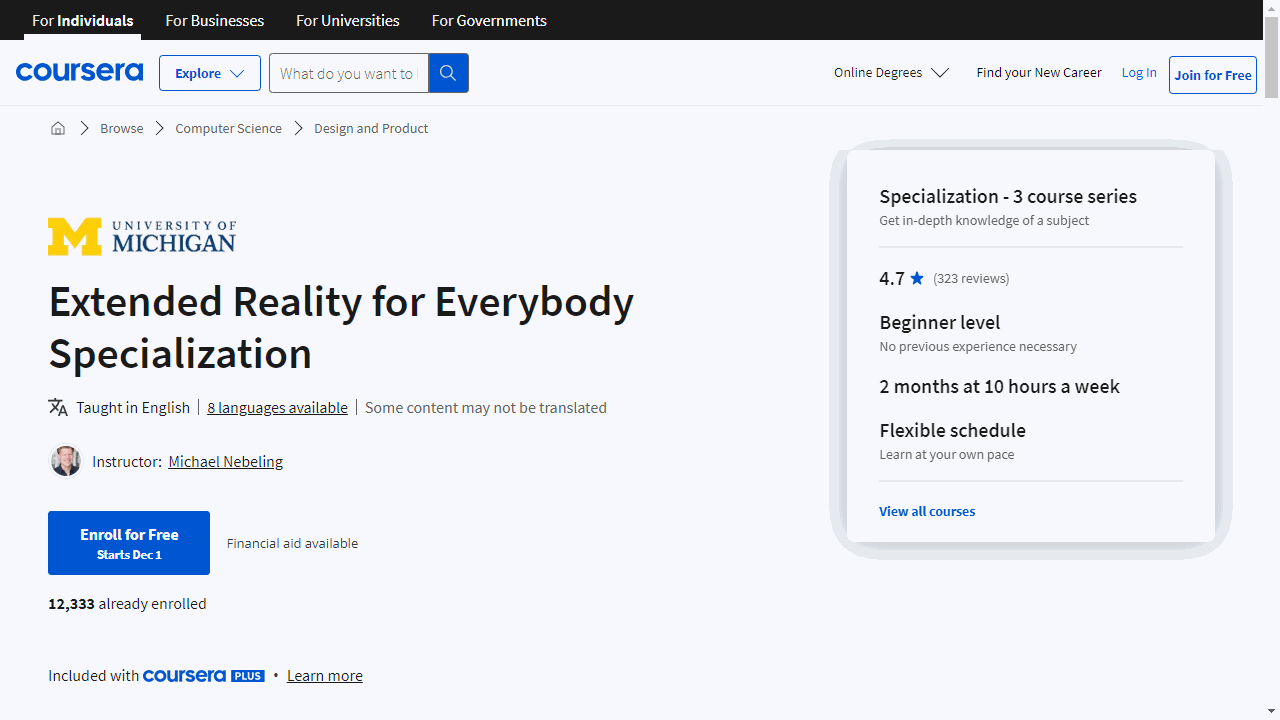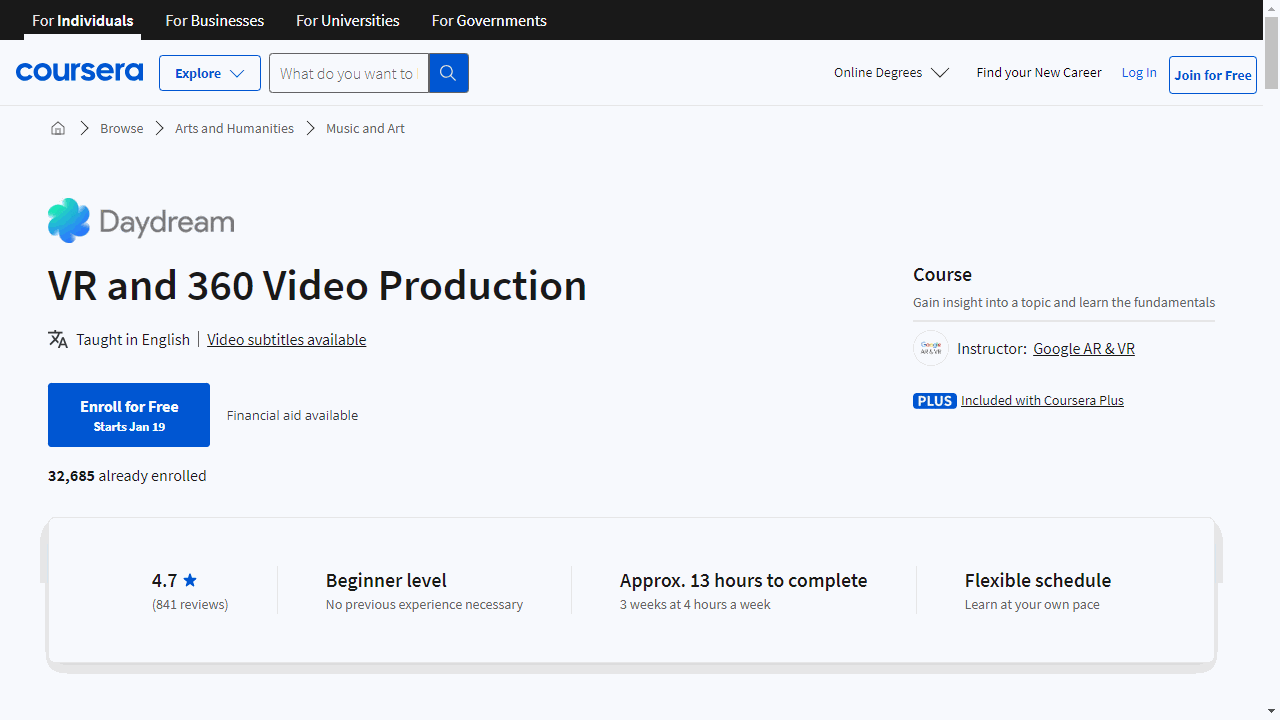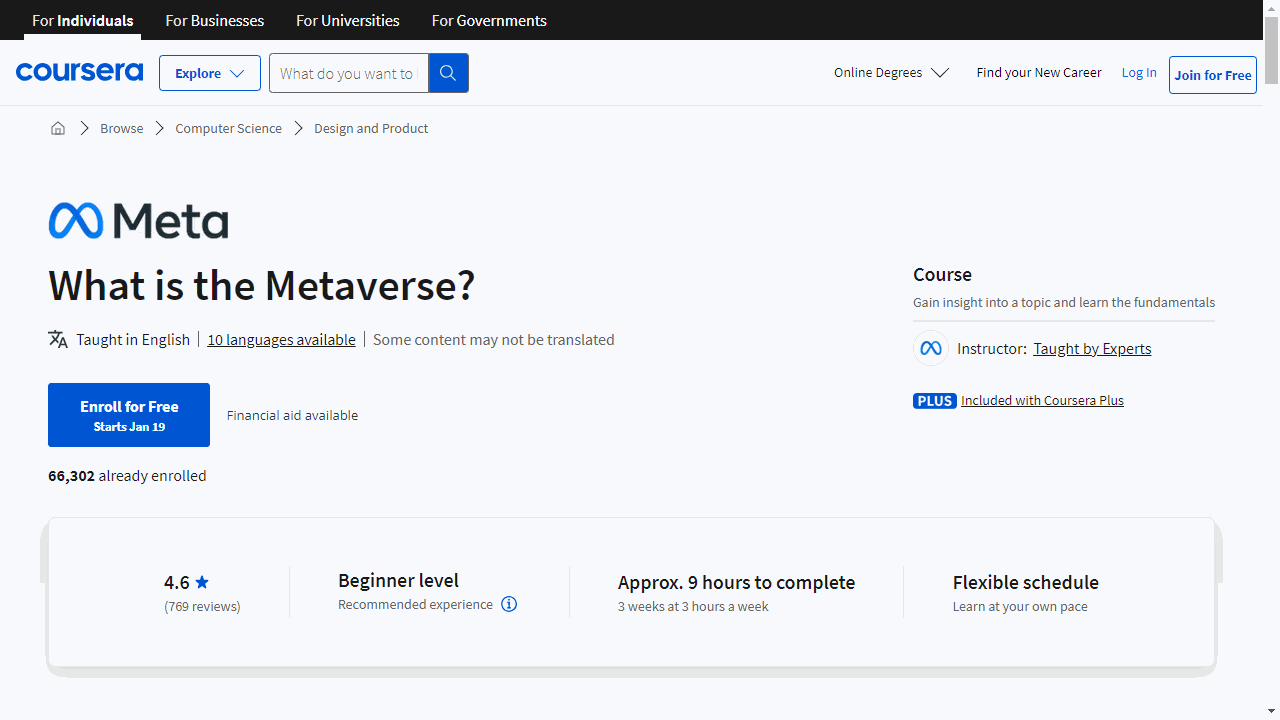Virtual reality (VR) is a rapidly developing field that offers a glimpse into the future of entertainment, gaming, and even everyday life.
From immersive gaming experiences to training simulations and educational tools, VR technology has the potential to revolutionize how we interact with the world around us.
However, breaking into this exciting field can be challenging, especially when trying to find the right course to get you started.
Navigating the sea of VR courses can be overwhelming.
Some courses focus on specific VR applications, while others offer a broader overview.
You might be searching for a course that covers everything from the fundamentals of VR to creating your own immersive experiences.
We’ve combed through the vast collection of courses on Coursera and identified Virtual Reality Specialization as the best overall course.
This specialization is highly regarded for its comprehensive approach, covering the history of VR, essential hardware like Oculus Rift and HTC Vive, and the principles behind creating VR experiences using Unity.
This is just the beginning.
Whether you’re interested in a specific aspect of VR, like game development, or you want a more general introduction to the field, we’ve got you covered.
Continue reading to discover the best VR courses on Coursera for your individual needs and embark on your journey into the world of virtual reality.
Virtual Reality Specialization
The specialization starts with “Introduction to Virtual Reality” to grasp the essentials of VR, including hardware like the Oculus Rift and HTC Vive, and the history of VR.
This foundational course equips you to assess VR applications and create your own using Unity, regardless of your prior experience.
“3D Models for Virtual Reality” transitions you from theory to practice.
Learn to craft 3D objects and immersive environments with realistic textures and sounds, all while optimizing for VR performance.
Unity3D serves as your creation tool, striking a balance between ease of use and professional capabilities.
In “3D Interaction Design in Virtual Reality,” the focus shifts to user engagement within VR.
You’ll explore natural body movements for interaction, moving beyond traditional button presses.
This course culminates in a project that solidifies your understanding of VR interaction principles.
“Building Interactive 3D Characters and Social VR” delves into the social dynamics of VR.
It covers the psychology behind virtual interactions and teaches you to animate and program 3D characters that respond to human cues, preparing you for the burgeoning field of social VR.
Lastly, “Making Your First Virtual Reality Game” synthesizes your learning into a capstone project.
From conceptualization to execution, you’ll create a VR game or experience, drawing on insights from industry veterans to polish your final product.
Extended Reality for Everybody Specialization
This is a comprehensive program that equips you with the knowledge and skills to navigate the expanding universe of XR, which includes AR, VR, MR, and beyond.
The specialization begins with “Intro to AR/VR/MR/XR: Technologies, Applications & Issues,” a course that lays a solid foundation.
You’ll gain clarity on the nuances of various XR technologies and their applications.
It’s not just theory; you’ll evaluate the potential and limitations of XR, and the honors track offers practical experience in assessing and designing XR solutions.
Moving on to “User Experience & Interaction Design for AR/VR/MR/XR,” this course is a deep dive into the creative process of XR design.
It’s about crafting user experiences that resonate.
You’ll learn through design thinking and prototyping, with a focus on ethical considerations.
The honors track here is particularly hands-on, guiding you through the creation of storyboards and prototypes, ensuring your designs are not only innovative but also user-centric.
Lastly, “Developing AR/VR/MR/XR Apps with WebXR, Unity & Unreal” transitions you from design to development.
This technical course demystifies the development platforms and tools essential for creating XR applications.
You’ll get to grips with Unity and Unreal, and the honors track provides a structured approach to building and implementing your own XR projects.
Each course in the specialization is rich with relevant skills and practical exercises, ensuring you’re not just learning, but applying what you learn.
The focus on ethics, accessibility, and privacy ensures you’re prepared to create responsible XR applications.
VR and 360 Video Production
Provider: Google AR & VR
This course gives you a solid foundation in the world of virtual reality, with a focus on creating immersive 360-degree videos.
You’ll start with the basics, understanding the difference between 3-DoF and 6-DoF, which dictate how you can interact with VR environments.
The course will teach you about creating a sense of presence and immersion, crucial for making your VR experiences feel real.
Technical aspects are made easy to grasp, with explanations of concepts like parallax, equirectangular projection, and how to manage the zenith and nadir in your videos to avoid visible stitch lines.
You’ll also learn the history of VR, giving you context for your creations.
When it’s time to plan your VR video, you’ll be guided through storyboarding, shot listing, and scheduling.
You’ll understand how to assemble a skilled crew for 360 productions and discover preproduction tools that streamline the process.
The course dives into the nitty-gritty of production, covering resolution, lenses, frame rates, and synchronization.
You’ll learn techniques for stabilizing your footage, managing lighting, and recording spatial audio that complements your visual content.
Post-production is where your project comes to life.
You’ll master editing equirectangular footage, maintaining viewer attention, and the workflow for VR video editing.
Plus, you’ll find out how to share your finished videos on platforms like YouTube.
For those eager to push boundaries, advanced production and postproduction techniques are also covered, ensuring your skills stay ahead of the curve.
By the end of this course, you’ll have the confidence and know-how to create VR and 360 videos that captivate and engage.
What is the Metaverse?
Provider: Meta
This course takes you on an insightful exploration of the metaverse, blending foundational knowledge with advanced concepts.
Starting with an introduction to the metaverse, you’ll quickly grasp its essence and the variety of experiences it offers.
You’ll have the chance to craft your avatar, which is your unique identity in this digital realm.
The course delves into how different metaverse components interact, a concept known as interoperability, and the importance of communication within this space.
You’ll also consider the environmental impact of the metaverse and learn how to foster a safe, diverse, and ethical environment.
Practical learning is a key part of the course, with field trips that allow you to experience virtual social settings, understand the creator economy, and discover the metaverse’s applications in education and healthcare.
For enthusiasts in sports, arts, or entertainment, the course reveals how these sectors are evolving within the metaverse.
If you’re interested in design, there’s a segment dedicated to metaverse architecture.
The course also addresses the commercial side, discussing how to navigate and capitalize on economic trends within the metaverse.
You’ll get insights into the underlying technology, like game engines and the concept of a supercomputer within glasses, which are pivotal to the metaverse infrastructure.
Looking ahead, the course touches on future technology, research, and development, and includes a field trip to observe partnerships between enterprises and universities.
By the end of this course, you’ll not only understand the metaverse but also be equipped with the knowledge to engage with it meaningfully.




